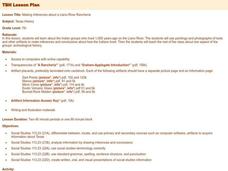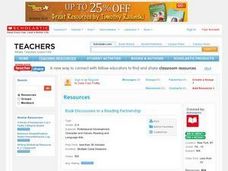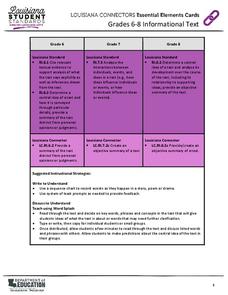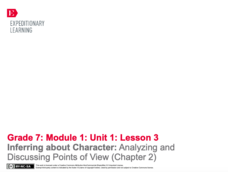NOAA
History's Thermometers
How is sea coral like a thermometer? Part three of a six-part series from NOAA describes how oceanographers can use coral growth to estimate water temperature over time. Life science pupils manipulate data to determine the age of corals...
CPALMS
Analyzing Vonnegut's View of the Future and His Commentary on the Present in Harrison Bergeron
Kurt Vonnegut's short story "Harrison Bergeron" engages adolescents with its theme about the dangers of complete societal equality. Learners complete a graphic organizer to track literary elements in the story, as well as an inference...
EngageNY
Contrasting Two Settings (Chapter 6: "Lost Melones/Cantalouples")
Continue working through Esperanza Rising, by Pam Munoz Ryan, by looking into language choices and discussing text-dependent questions. Pupils converse in small groups and as a class about plot, setting, and figurative language. Using...
NOAA
Journey to the Unknown
What's it like to be a deep-sea explorer? Tap into the imaginations of your fifth and sixth graders with a vivid lesson, the second part of a six-part adventure. Learners close their eyes and submerge themselves in an expedition aboard...
Curated OER
Making Inferences about a Llano River Rancheria
Seventh graders study the Indian groups who lived 1,000 years ago on the Llano River. They use paintings and photographs of tools and other artifacts to make inferences and conclusions about how the Indians lived.
Curated OER
Color Dots 2
Students develop simple observations. They observe bleeding of colored inks with water, to understand mixtures, and to make generalized inferences from their observations.
Curated OER
Let Your Motto Be Resistance: African American Portraits: Grades 3-5
Students explore the contributions of African Americans of the 20th century. In this African American history lesson, students examine portraits of Muhammad Ali, Romare Bearden, Lorraine Hansberry, Judith Jamison, and Leontyne Price in...
Curated OER
Hurricanes and Tornadoes (Grade 4-8)
Young scholars investigate the concepts of hurricanes and violent weather conditions. In this violent weather instructional activity, students access an Internet site and watch a video about how air masses behave, how a tornado forms,...
Curated OER
Esperanza Rising-Inferences
Sixth graders make inferences while reading. In this inferences instructional activity, 6th graders read Esperanza Rising and ask questions about the text.
Curated OER
Book Discussions in a Reading Partnership
Do you have a lot of different reading levels in your class? Pair kids up by level and have them choose a book to read independently. They will make predictions, ask questions, make connections, etc. Consider creating a general reading...
Louisiana Department of Education
Essential Elements Cards
Use essential elements cards to help lesson plan! Each card contains an informational text common core standard for grade levels six through eight and suggestions for activities and supports. Cards address skills such as citing textual...
Kenan Fellows
Effects of a Golf Course on Stream Health
Is the golf course causing issues in the stream? Find out with a resource that has groups perform chemical water tests to analyze the effects of a golf course on a stream. Pupils collect water above and below the course and analyze the...
Kenan Fellows
Using Water Chemistry as an Indicator of Stream Health
Will this water source support life? Small groups test the chemistry of the water drawn from two different sources. They then compare the collected data to acceptable levels to draw conclusions about the health of the source. The...
EngageNY
Inferring about Character: Analyzing and Discussing Points of View (Chapter 2)
Readers engage in discussion with partners to answer questions about A Long Walk to Water by Linda Sue Park. Next, they complete exit tickets, writing about how the author creates different points of view for her characters.
EngageNY
Inferring about Character: Analyzing and Discussing Points of View (Chapter 2)
Welcome to the World Café! Readers discuss A Long Walk to Water by Linda Sue Park. They circulate throughout the classroom, stopping at different tables to answer a discussion prompt with their classmates and record their ideas on a chart.
All for KIDZ
Building Relationships: The Orphan of Ellis Island
Family and friendship are two very important themes of the historical fiction novel The Orphan of Ellis Island by Elvira Woodruff. From video clips and writing prompts to reader's theater and family interviews, this resource...
NOAA
What Little Herc Saw
See the underwater world through a different pair of eyes! Middle school marine biologists identify deep-sea organisms by examining images taken by an ROV from the Okeanos Explorer. After determining what creatures lie beneath the...
EngageNY
Documenting Research: Sorting and Recording Information About the Wheelwright
Fourth graders practice using a graphic organizer to record their notes and answer text-dependent questions while supplying evidence of how they found their answer. They focus on a machine called the wheelright, which was commonly...
EngageNY
Launching Readers Theater Groups: Identifying Passages from Esperanza Rising for Readers Theater that Connect to the UDHR
Teach young readers how to compare two texts and select passages that exemplify a specific theme with Lesson 6 from Unit 3. Begin by modeling how an expert reader selects examples from a text, performing a think aloud on how Article 2 of...
NOAA
Watch the Screen!
Can a sponge cure cancer? Life science pupils visit the drugstore under the sea in the fifth lesson of six. Working groups research the topic then get hands-on experience by testing the inhibiting effects of several plant extracts...
Channel Islands Film
Cache: Lesson Plan 4 - Grades 4-5
After viewing the West of the West's documentary Cache, individuals craft either a newspaper article chronicling the discovery of the cache on San Nicolas Island, a historical narrative of the placement of the cache in the cliff side, or...
Curated OER
Scientific Thinking
Young scholars participate in four different activities which reinforce an understanding of they way scientists think about the world. They make careful observations of two different pennies, write the procedure for making a peanut...
Curated OER
A is for . . .
Students discuss the difference between making inferences and observations. They practice making observations and inferences regarding an apple.
Curated OER
Get the Joke!
Students explore humor through word context and inference used in everyday language.

























